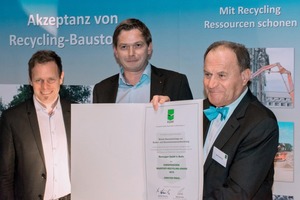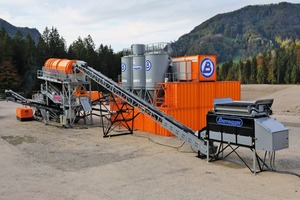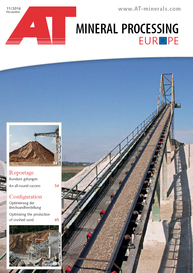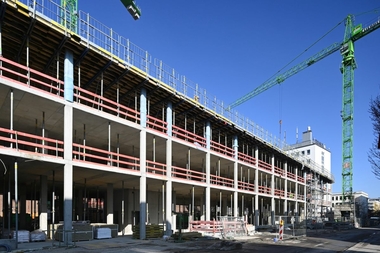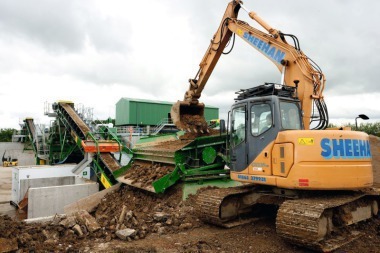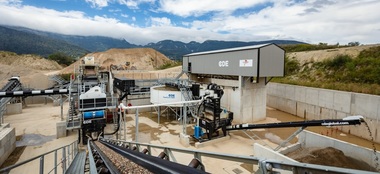Construction Materials Recycling in Europe
On September 23, 2016 the European Quality Association for Recycling e.V. (EQAR) held the EQAR Congress on the subject “Construction Materials Recycling in Europe” in Bratislava/Slovakia on the occasion of its existence for 10 years. EQAR Congress makes the need for action for more recycling of construction and demolition waste in Europe a subject of discussion.
In his inaugural address EQAR President Manfred Wierichs pointed to the fact that the state of construction material recycling differs remarkably in the various EU member states though construction material recycling is indispensable also for avoiding waste and protecting our European landscape areas. That is why EQAR supports a promotion of construction material recycling and an unrestricted product recognition of quality-secured recycled construction materials.
The respective need for action was shown by concrete examples in the panel discussion held at the EQAR Congress. There was e.g. reported from Czechia that dumping of 700 000 tons of construction waste per year in urban regions (4 km far from the city center) was to be regarded as “pseudo-recultivation” which nevertheless was permitted. This makes large-scale recycling of residual construction masses nearly impossible. It was shown for Slovakia that interest in extending recycling of construction and demolition wastes of the competent Ministry for the Environment is not to be observed. Thus, proposals submitted in writing for respective specific talks have been answered only after years and no representative of the Ministry for the Environment of Slovakia was ready to represent his country as rapporteur or discussion partner at the EQAR Congress held now for the first time in Slovakia.
Important legal steps are lacking in the EU countries where recycling of construction and demolition wastes has first to be established area-wide. This involves specific national legal targets for construction and demolition wastes which would be an absolutely necessary prerequisite to the development of recycling markets. Vincent Basuyau (Policy Officer Sustainable Construction at the EU Commission) explained that according to the EU Waste Framework Directive all EU countries are obliged to re-use at least 70 % of the harmless construction and demolition wastes or to subject them to recycling up to 2020. It will be an infringement of the law if this will not be observed. So far some of the EU countries have not reached these targets. However, this must not be the case as large support is offered by the EU Commission e.g. for training courses and technological investment. Basuyau added that the EU Commission, with experts from numerous EU countries participating, prepared the “EU Construction & Demolition Waste Management Protocol” (Draft Final Version of June 17, 2016).
The Protocol contains numerous best-practice examples of recycling construction and demolition wastes and is to serve as guide to action for the member countries. It is the target of the EU to ensure that recycled construction material will be comprehensively used by public authorities and private institutions. In addition the EU deals with putting into effect green criteria for placement of orders relating also to the construction of roads and buildings. The Austrian Construction Materials Recycling Association pointed to the fact that minimum rates for recycled materials should be prescribed in the public placement of orders. The legal basis for that is to be found in Annex I, no. 7 c of the EU Construction Products Regulation. There it says that environmentally compatible raw materials and secondary construction materials have to be used for structures. Unfortunately this is mostly not considered in the tendering practice.
An aspect made repeatedly the subject of discussion at the EQAR Congress was the demand for an EU-wide regulation of the end-of-waste for recycled construction materials. So far only five EU member countries adopted respective end-of-waste criteria and this with a differing level of regulation. To ensure that quality-controlled recycled construction materials shall be no longer regarded as waste and thus not be disadvantaged as compared with primary construction materials EU-wide end-of-waste criteria should be adopted for them. This will also facilitate the border traffic of these materials over EU internal borders which will be of great importance to implementing an internal European market for construction products. The participants of the Congress expressed their disappointment that aspirations of the EU Commission to specifically regulate the end-of-waste for recycled construction materials throughout Europe are not to be recognized.
Also this year the EQAR Award was presented at the EQAR Congress. It was presented to the company “GB Energy Holding s.r.o.” from Brno in Czechia. The prize was awarded for the procedure of GB Energy relating to recycling of demolition wastes to concrete and concrete components. This is an integrated procedure from construction demolition to utilizing demolition marterials in ready-mixed concrete and concrete components. The second prize was awarded to the company Bernegger GmbH from Molln in Austria (Fig. 1). The company developed a container-mobile wet screening plant for soil and residual construction mass processing which is ready for use within one week completely independently throughout Austria (Fig. 2). A high portion of re-usable materials may be obtained by the multi-stage mechanical treatment of the wet screening procedure. The process water is recycled and constantly treated in the plant itself. The output products are of a very high quality whereas it is possible to enrich the fine fraction with pollutants and to dispose them. By means of the container-mobile wet screening plant a high-quality waste treatment is possible at the site of production. This reduces also the costs of transports to stationary processing plants.
$(LEhttp://

